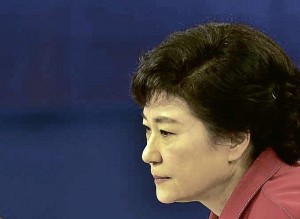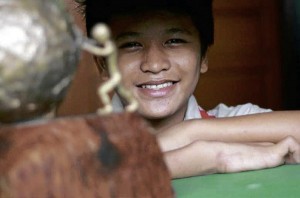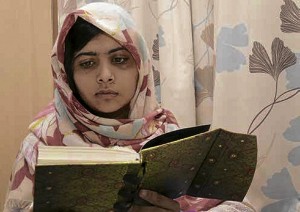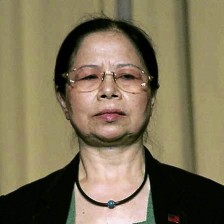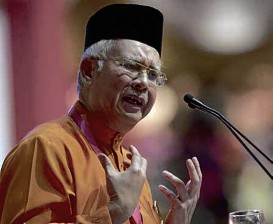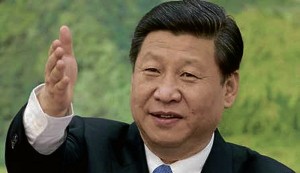Asian of the Year
They struggled to succeed. Their stories are proof that hard work, perseverance and strong will pay off. It helps to have a civic and charitable heart, too.
The Asian of the Year (2012), chosen by AsiaNews, was Park Geun-hye, who is set to become South Korea’s first woman president on Feb. 25. AsiaNews is the magazine of Asia News Network, a group of 21 newspapers, including the Philippine Daily Inquirer, in 18 countries.
Those who made it to the AsiaNews short list included PSY, Cris Valdez, Malala Yousafzai, Chen Shu-chu, Najib Razak, Syeda Rizwana Hasan and Xi Jinping.
IT was an exciting year for PSY whose video was viewed more than 1 billion times on YouTube, but it was not an easy path even for someone who was actually born in the affluent Gangnam district in Seoul.
The 34-year-old rapper was poised to take over his father’s business but ditched that path to study at Berklee College of Music in Boston, before similarly abandoning that to return to his native South Korea in 2000 to pursue his dream to be a singer.
His history though showed he did not have the DNA to be a super idol: He was arrested for possession of marijuana, accused of dodging military duties and is married with twin daughters. (Idols are supposed to be “available” for life.) He described himself as “chubby.” His songs have also courted controversy because of obscene lyrics.
But his sixth album, “PSY 6” (Six Rules), released in July, included the song “Gangnam Style,” and opened a door for him to the world. Suddenly, he was teaching Britney Spears on Ellen DeGeneres’ show how to dance the song’s infectious “horse dance,” meeting with UN Secretary General Ban Ki-moon and performing before massive crowds from Seoul to Paris, something that other Korean stars attempted but could only dream of.
Many have dismissed PSY as a flash in the pan, with Time magazine naming him as the year’s “most fleeting star.” But he has a 12-year career to back him up and while it will be difficult to top “Gangnam Style,” last year’s favorite oppa (literally older brother) will continue to entertain his loyal fans in his own style. The Korea Herald
SHE made history when she won the presidential election in South Korea on. Dec. 19, 2012, making her the country’s first woman who is set to become its president next month.
Debate over her sheltered past—interwoven with some extraordinary rumors and scandals—was offset by her resolve to lead the country and vow to be the cleanest president, without a family to turn to or debts to repay.
The first child of Park Chung-hee and Yook Young-soo, Park was born on Feb 2, 1952, in Daegu. Her life changed in 1961, when her father led the May 16 military coup d’etat, consequently becoming the junta leader for two years and was named the fifth president in 1963.
Tragedy struck Park when she was studying in France in 1974, after graduating from Sogang University with a major in electronic engineering. Her mother was assassinated by pro-North Korean man Moon Se-kwang. At the age of 22, Park became the country’s acting first lady.
Five years later, her father was assassinated by his intelligence chief.
Between 1979 and 1997, Park stayed away from the spotlight. By the 1980s, she began to make more public moves, holding interviews and starting memorial projects to restore her father’s honor.
It was not until 1997 that Park decided to enter politics after seeing the nation falter during the foreign exchange crisis.
Park made her first presidential bid in 2007 but lost to then-candidate Lee Myungbak in the primaries. In the 2012 campaign, Park faced growing demands by opponents to clarify her position on the oppressive rule of her father. She held a news conference in September and apologized for the first time for her father’s rule. Lee Joo-hee, The Korea Herald
VALDEZ, 13, was once told he was the source of bad luck in the family. For a while, he started to believe it, too. Beaten up by his father and neglected by his mother, the boy ran away from home and became a street urchin, scavenging through piles of garbage and spending his nights in an open tomb.
But now Valdez is the bringer of smiles to thousands of street kids like himself as the founder of “Championing Community Children,” an organization that gives flip-flops, toys and toothbrushes to deprived children in his hometown of Cavite City.
He was awarded the International Children’s Peace Prize in The Hague, where he received $130,000. The peace prize was launched during the 2005 Nobel Peace Laureates’ Summit by former Soviet leader Mikhail Gorbachev.
“My message to all children around the globe is: Our health is our wealth! Being healthy will enable you to play, to think clearly, to get up and go to school, and love the people around you in so many ways.” DJ Yap, Philippine Daily Inquirer
SHE was sitting on her school bus, waiting to return home from morning lessons in Mingora City in the Swat Valley. A Taliban gunman jumped onto the bus and shot her in the head and leg. She survived the Oct. 9 attack.
Malala first came to public attention in 2007, aged just 11, when she started writing a blog for BBC’s Urdu service, describing her terror that her education would come to a halt “because the Taliban had issued an edict banning all girls from attending schools.” She later appeared on national television to discuss girls’ education.
Taliban put her on a hit list at the start of 2012. She said if the Taliban stopped her, she would take her sandal and “hit them on the face and say, ‘What you’re doing is wrong. Education is our right, don’t try to take it from us.’”
As she lay in intensive care of a hospital, people marched in their thousands all over Pakistan and many parts of the world, bearing banners saying “I am Malala.” Despite what happened, Malala’s spirit appears unbroken. “Fight for yourself and who you are,” she tweeted recently. “You’ve got to go through the worst times in life to be the best.” Samira Shackle, Dawn
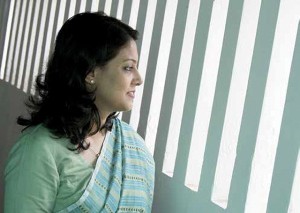
SHE SOUGHT a Supreme Court order 10 years ago to prevent the pollution of coastal and marine ecosystem caused by the disposal of hazardous materials from breaking old ships and to ensure the protection of the rights and safety of workers in the industry. As a result, the Bangladesh government was compelled to form binding policies to restrict the import of hazardous ships.
Her work to protect the environment has gained her recognition, including a Ramon Magsaysay Award 2012. To strengthen her fight to protect the environment and the people dependent on it, Hasan plans to move community issues forward by taking the community along. “Mobilize, resist and transform” will be her slogan. Tamanna Khan, The Daily Star
BY LIVING a spartan lifestyle, Chen has given away $320,000 out of her modest earnings as a vegetable vendor to several charities engaged in early childhood care and children’s education.
Asked why she was giving away her hard-earned money, she replied: “I accumulate virtue instead of wealth. Life is short and you don’t know when you will die.”
Before receiving the $50,000 cash prize that came with the Ramon Magsaysay Award 2012, she had decided to donate it to a general hospital in Taitung. In 2010, Forbes magazine named Chen one of the “48 Heroes of Philanthropy.” Philippine Daily Inquirer
IN THE RUN-UP to the signing of the southern Philippines’ landmark preliminary peace deal in October, Malaysia’s Prime Minister Najib Razak was found to be a familiar name in the region.
Since 2001, Malaysia has served as third-party facilitator in the peace process between the Philippine government and the Moro Islamic Liberation Front (MILF) to help end a 40-year-old conflict that has left more than 150,000 people dead.
The breakthrough came in 2011 when President Aquino met MILF chair Murad Ebrahim in Tokyo where the two spoke candidly about the peace process.
Kuala Lumpur hosted and facilitated 32 rounds of peace talks which ultimately paid off with the signing of preliminary pact on Oct. 15, 2012, in Manila.
“I give my assurance to all the people of the Philippines we will stand with you to make this agreement work,” he said in remarks before the signing ceremony. “Today, something has changed. Today, we turn our backs on violence and turn instead toward a new and brighter future.” Razak Ahmad,
The Star
HIS TENURE at the top as Communist Party of China chief is expected to span a full decade, but the 59-year-old does not seem to think he has enough time. He is a man in a hurry, striking a posture between doves and hawks.
Since he ascended to the top of Chinese politics in November, the leader of the unfree world—as Time magazine called him—has shown that he wants to get things done and he wants to do them now.
“Empty talk is useless; only hard work can achieve the revival of a nation,” he said in his second national speech as party chief, which was noted for its lack of jargon or ideological verbiage.
More importantly, he sent out a strong signal that the party and its members were not above legal restraints. “No organization or individual has the special right to overstep the Constitution and law.”
Clearly, his comments were targeted at officials’ rampant corruption and abuse of power, which have fueled much unhappiness and unrest.
That was not all. After Xi chaired a Politburo meeting in early December, a statement was issued with a surprisingly robust and clear eight-point pledge to overhaul the working style of top Chinese leaders.
Among the changes, traffic controls for leaders’ trips will be reduced to avoid unnecessary inconvenience to the public—a major bugbear of Chinese motorists. Ceremonies to welcome and send off visiting leaders will be downsized, while hangers-on for overseas visits will be dropped. Wordy meetings are also out. Peh Shing Huei, The Straits Times

















